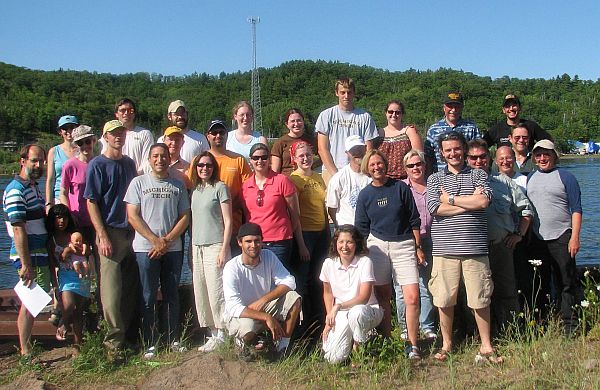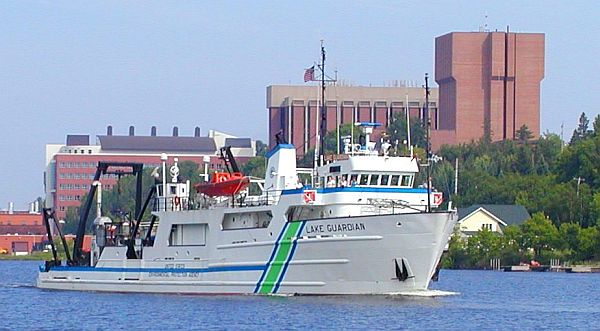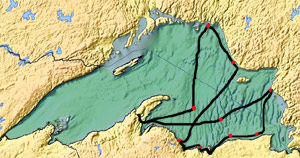About the Course
The EPA's Lake Guardian research vessel returned
on Saturday, July 15 to disembark sixteen undergraduate and
graduate students, and middle/high school teachers who had the
good fortune to participate in a week-long course aboard the
ship from July 9-15. The one-week course was co-sponsored by
the U.S. Environmental Protection Agency (EPA) and Michigan
Technological University.
Seven faculty and scientists from Michigan Technological University
and the Upstate Freshwater Institute (Syracuse, NY) and the
Stennis Space Center, Mississppi instructed the course. Topics
addressed during the week include the Lake Superior food web,
lake bottom sediments, toxic substances, fisheries, air quality,
as well as, a demonstration of how Remotely-Operated Vehicles
(ROVs) are used to learn about the Great Lakes.
The Lake Guardian is the research vessel used
by the EPA to gather data concerning the chemical and biological
conditions of the five Great Lakes, and to monitor pollutant
concentrations. It is fitted with state-of-the-art navigational,
laboratory and mechanical equipment. As part of its long-term
trends program, the EPA conducts monitoring surveys of the Great
Lakes every two years. The Lake Guardian has six laboratories
and a variety of navigational and monitoring equipment used
to gather data on the chemical and biological conditions of
the five Great Lakes.
From Michigan Tech
Department of Civil & Environmental Engineering:
Dr. Marty Auer, Lead Faculty
Dr. Noel Urban, Faculty
Dr. Judith Perlinger, Faculty
Mr. Sinan Abood, Instructor
Mr. Ziad Ahmed, Instructor
Mr. David Tobias, Researcher
Mr. Nick Ravenna
Department of Biological Sciences
Dr. Nancy Auer, Faculty
School of Forest Resources and Environmental
Science
Mr. Mark Gleason, Faculty
Department of Chemistry
Dr. Sarah Green, Faculty
Mr. Matt Seguin
Ms. Anita Quinn, Participant
Director, Research & Sponsored Programs, Michigan Tech
Dr. Alan Weidemann, Faculty
Naval Research Laboratory
Stennis Space Center, Mississippi
Mr. David O’Donnell, Researcher
Mr. Tony Prestigiacomo, Researcher
Upstate Freshwater Institute
Students:
Michigan Tech:
Kyle Bareither, Whitney Sauve, Carly Bock, Cory McDonald,
Mark Rowe, Carl Schroeder, Lisa Tomlinson,
Teachers ( K-12) and students from
other schools
Maxime Bridoux, SUNY – Dept. Environmental Chemistry,
Albany, NY
Lisa Hoogenboom, Maine South HS, Buffalo Grove, IL
Robert Kaukola, ,GFW Middle School, Fairfax, MN
Ashley Parks, University of North Carolina
Sharon Heineman, Culver Academies HS, Culver, IN
Paul Rogalla, Indianola Middle School, Indianola, Iowa
Scott Graham Martin, American School of Japan
Ann Marie Miller, BS Water Science. NMU,
Marquette, MI
About the Institute
A team of faculty and scientists from Michigan Technological
University (MTU) and U.S. EPA for went on a working cruise on Lake Superior
in support of bi-national Great Lakes monitoring programs. Course
participants attended lectures and labs led by MTU instructors,
providing a comprehensive introduction to the physical, chemical,
and biological features of Lake Superior and the ecosystem’s
lower food web.
The course was designed for upper level undergraduates, graduate
students, and science/math high school teachers. Participants
engaged in the collection of research data, working
alongside Michigan Tech and EPA scientists during the long days
and nights characteristic of a scientific cruise. This unforgettable
course provided a strong foundation in Great Lakes limnology
as well as hands-on participation in Lake Superior research
unavailable in traditional coursework.
The curriculum included lectures on limnological principles,
demonstrations of sampling and analytical methods, case studies
of current research, and group discussions. Cruise-long exposure
to lower food web modeling was offered using EPA’s
AQUATOX software. The modeling experience was intended to integrate
field/laboratory observations with concepts critical to an understanding
of lower food web dynamics. The class was divided into groups
and rotated through laboratory, research and modeling modules
to provide the best possible small group experience.
Course Credit
Participants earned 3 semester credit hours from Michigan
Technological University. To receive credit, participants must
complete pre-course readings, engage in all course activities
and complete, by August 1st,:
• a cruise journal;
• an analysis of research data;
• a food web modeling exercise; and
• a contribution to the cruise web page
There will also be a final examination.
Professional Education
Credits earned from this course can be applied towards an 18 semester-hour
planned course of study for teachers working toward their Michigan
Professional Certificate or applied towards MTU’s Master
of Science in Applied Science Education program. For more information,
contact Dr. Bradley Baltensperger at 906-487-2460 or brad@mtu.edu.
Participants enrolled in other degree program at Michigan Tech
should inquire about the applicability of credits earned in this
course. For more information: http://www.ed.mtu.edu/ . Students
from other institutions may inquire about credit transfer.
Links
Western
U.P. Center for Environmental Education Ecology of the Great Lakes
Links to severa previous Great Lakes Ecology
Institutes
State
of the Lake (2003)
A three-day conference entitled, Superior:
State-of-the-Lake
Great
Lakes and Lake Superior websites
US EPA Great Lakes
National Program Office
RV
Lake Guardian Website
RV
Agassiz Research Vessel





